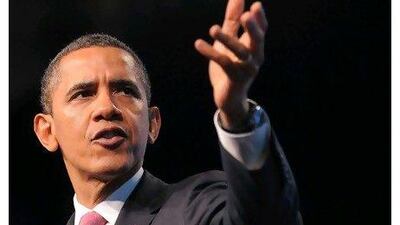WASHINGTON // Barack Obama delivered his most explicit threat yet that the United States would use force to prevent Iran from obtaining nuclear weapons.
But the US president also said international sanctions should be given more time, and blamed "too much loose talk of war" for helping Tehran and driving up the price of oil.
Mr Obama told delegates from the most influential pro-Israel advocacy group in America that Israelhad a "sovereign right" to make its own security decisions.
"Iran's leaders should know that I do not have a policy of containment; I have a policy to prevent Iran from obtaining a nuclear weapon. And as I've made clear time and again during the course of my presidency, I will not hesitate to use force when it is necessary to defend the United States and its interests," he said.
Mr Obama was speaking at the opening session of the annual policy conference of the American Israel Public Affairs Committee (Aipac). His remarks come at the beginning of a crucial series of meetings this week between US and Israeli leaders in Washington and amid a growing clamour from Israel for a stronger US position on Iran's nuclear programme.
The focus on Iran means that for the first time in years the Palestinian issue is not the top priority in US-Israel talks. Some analysts even wonder if the peace process will be discussed at all today when Mr Obama meets Benjamin Netanyahu, the Israeli prime minister.
Mr Obama did tell Aipac delegates that the pursuit of peace remained "more important, not less" in view of the Arab Spring.
"I believe that peace is profoundly in Israel's security interest. The reality that Israel faces - from shifting demographics, to emerging technologies, to an extremely difficult international environment - demands a resolution of this issue."
But the bulk of his speech was spent reassuring his audience that the US "will insist upon Israel's security and legitimacy" and that a nuclear-armed Iran is not only "completely counter" to Israel's security interests, "it is also counter to the national security interests of the United States".
"I have said that when it comes to preventing Iran from obtaining a nuclear weapon, I will take no options off the table, and I mean what I say. That includes all elements of American power. A political effort aimed at isolating Iran; a diplomatic effort to sustain our coalition and ensure that the Iranian programme is monitored; an economic effort that imposes crippling sanctions; and, yes, a military effort to be prepared for any contingency."
Mr Obama, however, will also urge Israel to cool talk of a military strike on Iran when he meets Mr Netanyahu today. In his speech to Aipac he said the US would use force only "when the time and circumstances demand it".
The US and Israel openly differ on the urgency with which to attempt any violent disabling of Iran's nuclear programme. Israeli leaders have said time is running out to stop Iran from acquiring nuclear weapons, but the US wants to give international sanctions more time.
Avigdor Lieberman, the Israeli foreign minister, said yesterday Israel would decide whether to strike Iranian nuclear targets as an "independent state". Shimon Peres, Israel's president, who also spoke at the Aipac conference, also chimed in.
"Iran is an evil, corrupt regime," he told delegates. "Iran's ambition is to control the Middle East so it can control a major part of the world economy. It must be stopped, and it will be stopped."
Tehran denies that it is seeking nuclear weapons. Ayatollah Ali Khamenei, Iran's supreme leader, last month repeated his position that holding such weapons was "a sin" in Islam.
Israel is convinced, however, that Iran is forging ahead with a weaponisation programme and that international sanctions will not be enough to deter Tehran. Ehud Barak, the Israeli defence minister, has invoked a "zone of immunity" that if reached, would render any Israeli attack on Iran's nuclear sites less effective.
Mr Obama will have to persuade Mr Netanyahu today to trust that the US does not "bluff" when it says all options are on the table, as he said in an interview with The Atlantic magazine published on Friday, and allow sanctions more time.
The challenge for Mr Obama is to convince Israel - a country that wants to be able to dominate its regional environment unaided - to rely on the US, said Robert Danin of the Council on Foreign Relations.
"The Israelis want a clearer indication of a serious American military threat in order for them to feel comfortable in standing down," Mr Danin said.
"We are coming to what the Israelis believe is a decisive moment, after which their ability to act is going to be severely hampered and they are going to have to entrust another country with their national security."
The focus on Iran has shunted aside talk over the faltering peace process with the Palestinians, and the topic might not come up at all when the Mr Obama and Mr Netanyahu meet, said Mark Perry, an independent Washington-based military and political analyst.
Mr Obama made the Palestinian-Israeli peace process an early priority for his administration, but Israeli intransigence on settlement construction in occupied territory has haunted attempts to establish a credible negotiations process. Now, suggested Mr Perry, should the topic come up on Monday, the differences will still be there, but any US criticism of Israel would be "mild".
But the administration also has to contend with a domestic political environment in which there is blanket support for Israel in the US Congress. In December, and over White House wishes, the Senate voted 100-0 - a very rare unanimous vote - to target Iran's central bank in sanctions against the country.
And with a presidential election looming later this year, Mr Perry said, Republican presidential hopefuls see the Iran issue as an opening to criticise Mr Obama for being soft on Iran and tough on Israel.

